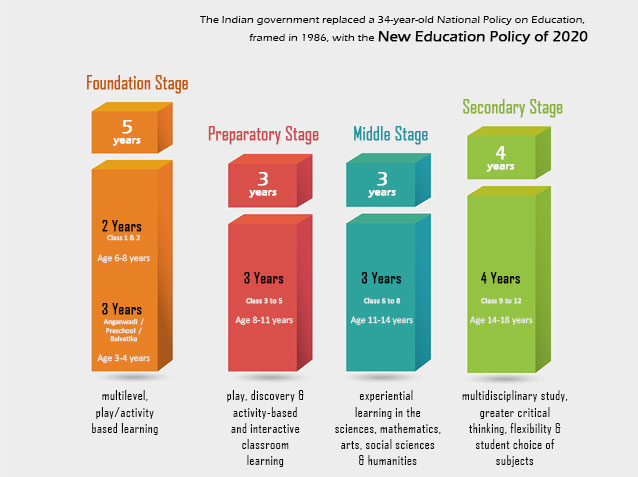Explained: What is the 5+3+3+4 Class System Under National Education Policy 2020

Credits : www.thebetterindia.com
The National Education Policy, introduced on 29 July 2020, has created quite a buzz on school Whatsapp groups and social media platforms. This change comes after almost three decades. The last policy was introduced in 1986. One amongst the many changes is structural reforms in the school system from the existing 10+2 model.
The new model is likely to look like this — 5+3+3+4.
So what exactly does that mean and how will it impact you and your children.
1. Students in the age group of 3-8 years will be part of the foundational stage. This stage will be split into two:
Three years of playschool/anganwadi and two years in primary school (grades 1 and 2).
2. This policy brings into the fold the already existing playschools into the formal education.
3. Preparatory Schooling Stage: For children between 8-11 years of age in grades 3 to 5. There will be a greater emphasis on experiential learning across the sciences, mathematics, arts, social sciences, and humanities.
4. Middle school: For students between 11-14 years in grades 6 to 8. The thrust for this level will be to have a subject-oriented pedagogical learning style.
5. Secondary level: The final stage is for students between 14-18 years. This stage is again split into two sub-stages: covering grades 9 and 10 in one cohort and grades 11 and 12 in another.
This stage will promote critical thinking, attention to life aspirations, and also allow flexibility of subjects.
6. According to the proposal, students will also have the option of exiting during grade 10 and re-entering at a later stage in grade 11.
7. The total number of years a student spends within the school education system remains the same. What changes with the policy is how the years are split
8. There will also be more emphasis on integrating vocational education and internships from grades six onwards. This is to equip students with new skills. Carpentry, electric work, metal-work, gardening, pottery making, etc., are to be introduced during grades 6-8, as decided by states and local communities. This is to ensure that at least 50 per cent of the students by 2025, have comprehensive exposure to vocational education.
9. To that end, a ten-day bagless period will be introduced in grades 6 to 8, wherein students will get a chance to intern with local vocational experts. Coding is set to be introduced to students of grades 6 onwards.
10. The assessment system will be comprehensive and shall use artificial intelligence to show the learning outcome, the shortcomings, and what corrective measures are required for each individual student.
11. While up until now there was a clear demarcation between ‘curricular’, ‘extracurricular’, or ‘co-curricular’ activities, with the new policy, the intent is to merge them all. Subjects such as physical education, the arts and crafts, and vocational skills, in addition to science, humanities, and mathematics, will be incorporated throughout the existing school curriculum.
Back to All Mumbai Educational News
To Get More Information About Education portal Mumbai Or Call us On 9930011452 or Email us On info@edgrade.com
Share This:
Source: www.thebetterindia.com
